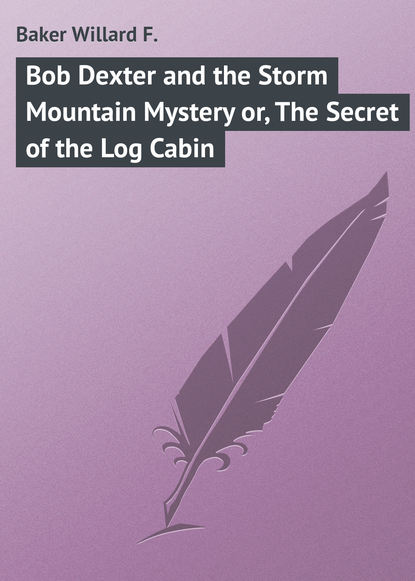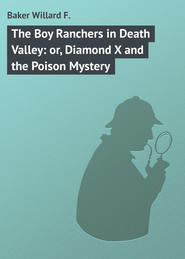По всем вопросам обращайтесь на: info@litportal.ru
(©) 2003-2024.
✖
Bob Dexter and the Storm Mountain Mystery or, The Secret of the Log Cabin
Настройки чтения
Размер шрифта
Высота строк
Поля
“Yes, it does. But they may be on there yet. This isn’t the end of the milk run. I’ll ask the conductor.”
The latter was walking up and down the platform waiting for the completion of loading on more rattling cans of milk. He knew Bob, and greeted him.
“Man with an iron hook?” questioned the ticket puncher. “Yes, he got on at Cliffside.”
“Was there another man with him – a smooth-shaved man?”
“Yes, Bob, there was. I didn’t have many passengers – we seldom do this time of year, with the excursion business over. But I remember those two.”
“They had tickets for Perry Junction, didn’t they?”
“Yes, now I recall it, they did.”
“But they aren’t here.”
“No, Bob, they got off somewhere between Tottenville and Andover. I noticed them at Tottenville, but I didn’t see them at Andover.”
“But there isn’t a station between those two places.”
“No station, Bob, but we stop at three white posts to pick up milk. Farm-stations we call them – not regular stops for any except my train. These fellows could have gotten off anywhere along there, and they probably did.”
“Shucks!” ejaculated Bob. “That’s it! I might have known they wouldn’t give themselves away by coming to the place for which they have tickets. They got off at some place where they wouldn’t be noticed. Well, I guess we might as well go back,” he told the constable.
“How about searching the train?” asked the latter eagerly. “They might be concealed somewhere on board, Bob.”
“No, I don’t think so,” said the conductor. “They just dropped off at one of the white post stops between Tottenville and Andover. Why, was there anything wrong about them?”
“Suspicions, mostly, that’s all,” said Bob.
The last can rattled aboard, the conductor gave the signal, the engineer gave two toots to the whistle and the milk train pulled away from Perry Junction.
“Guess they had you barkin’ up the wrong tree, didn’t they, Bob?” asked the constable as they rode on back to Cliffside.
“In a way, yes. But, after all, maybe it’s just as well it turned out like this.”
“Just as well, Bob? Why, don’t you want to help find the rascal that robbed Hiram?”
“Yes, but I don’t believe either of these fellows did.”
“Who did then?”
“That’s what I’m going to find out.”
It was with this end in view that, two days later, Bob paid a visit to the Mansion House where Jolly Bill Hickey was still staying. Bob had a long talk with Nelson Beel, the proprietor.
“Certainly, Bob, I’ll let you do it,” was the permission given. “But I don’t like any disturbance about my place.”
“There won’t be any, Mr. Beel, I promise you that. It will all be done very quietly.”
“All right, Bob, go to it.”
Thereupon the young detective began some new tactics.
CHAPTER XXII
THE BRASS BOX
Nearly every town, or small city has, or had at one time, a large hotel known as the “Mansion House.” In this Cliffside was no exception, and the chief hostelry bore that name. It was a big, rambling, old-fashioned structure and, in its day, had housed many a “gay and festive scene,” to quote the Cliffside Weekly Banner which once ran a series of stories about famous men and places in the community.
However, though the Mansion House may once have had such a distinction as being a place (one of several thousand) where George Washington stayed overnight, now were its glories departed, and it was but an ordinary hotel. Some old residents, who had given up their homes, lived there the year around. It was the stopping place of such traveling men, or drummers, who occasionally came to the place, and the annual “assembly ball” was held there.
Being an old-fashioned hotel it had many connecting and adjoining rooms, with doors between, and transoms of glass over the said doors. It was a “family” hotel, to use the expression Mr. Beel often applied to his place.
Consequently it wasn’t difficult for Bob Dexter to secure a place of observation near the room where Jolly Bill Hickey had elected to stay for a time.
“I don’t know how long I’ll be here,” Bill had said to Mr. Beel, when Bob drove him to the place the morning of the discovery of the crime on Storm Mountain.
“Stay as long as you like – we’ll try and make you welcome!” Mr. Beel had said with the bluff heartiness that characterized him when greeting a new guest.
“And you’re sure no one will object to my wooden leg?” asked Jolly Bill.
“Huh! I’d like to see ’em!” snapped out the proprietor. “You got just as good a right to have a wooden leg as another man has to have two of flesh and blood, I reckon.”
“Thanks. I’ll do my best not to make any trouble.”
So had Jolly Bill taken up his residence, and his reference to having a “few shots left in the locker” to pay his way was amply borne out, for he met his weekly bills with great regularity.
“There’s a little cubbyhole of a room next to his,” Mr. Beel had said when Bob broached his new tactics. “It used to be used to store drummers’ trunks in, when Cliffside did a bigger business than it does now. You can get in there and look over the transom if you like.”
“Well, I’ll try it. Maybe it will be a longer session than I anticipate. But don’t let it be known that I’m there.”
“I won’t, Bob. You can slip in any time you like. I’ll furnish you with a key. And you’ll have a good excuse in being here.”
“Yes – arranging for the annual banquet of the Boys’ Club.”
For there was such a function, and it was always held at the Mansion House, the club house not being large enough. Bob had gone to the trouble of getting himself appointed a member of the Banquet Committee, and though it was still some weeks before that affair would take place, it gave sufficient excuse, in case he was questioned, to account for his presence in the hotel.
Thus it was arranged and Bob, deserting his friends and relatives for the time being, took up his quarters in the little cubbyhole of a room, adjoining that which harbored Jolly Bill and his wooden leg.
Just what Bob hoped to find out or prove he hardly knew in his own mind. Certainly he did not tell Ned or Harry, for he couldn’t. It was all so vague – merely a suspicion.
“What’s got into old Bob lately?” asked Harry of Ned, a few days after the futile chase of the milk train.
“Oh, he’s working on that Storm Mountain mystery, you can depend on that.”
“Has he said anything to you about it?”
“Nothing special. Bob never does when he’s following close on a clew. But he said he might not see us for a few days.”










